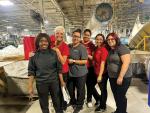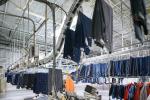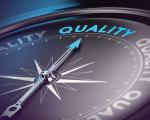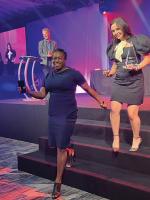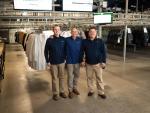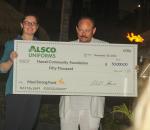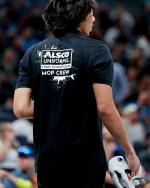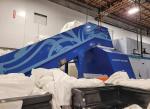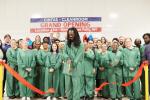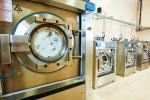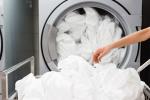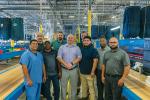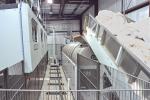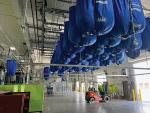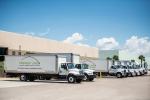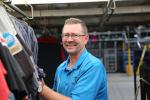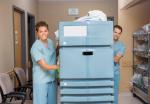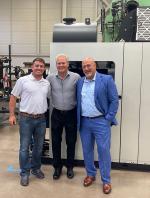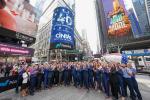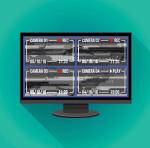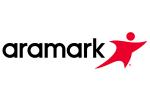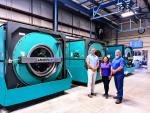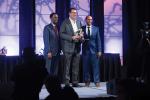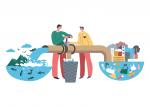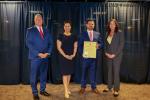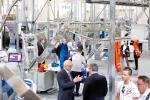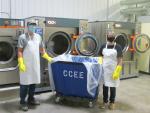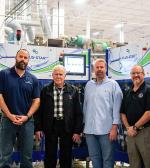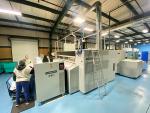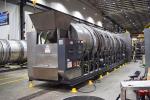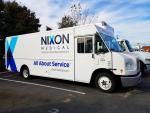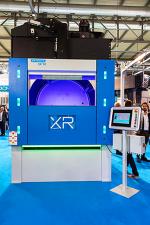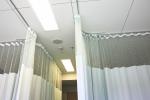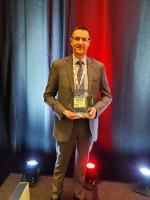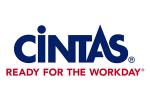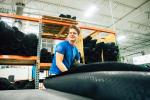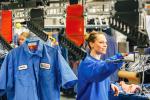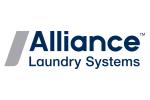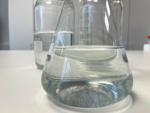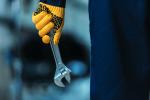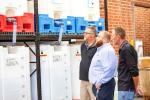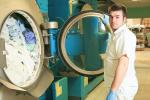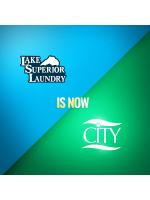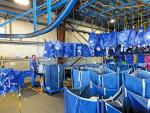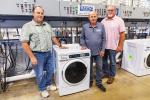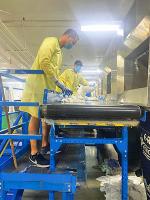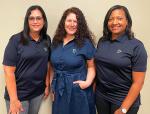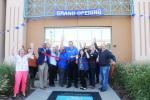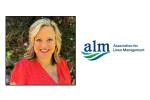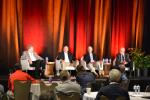OSH KOSH, Wis. — Brightwater Laundry of Tennessee in Sevierville recently completed a massive automation project that positions the company to process up to 10 million pounds of customer-owned goods (COG) per year, according to Laundry Project Manager Matthew Shadle.
The commercial laundry, which serves the booming vacation rental and hospitality markets of Eastern Tennessee, immediately launched laundry productivity, lowered labor costs and improved end-product quality.
The icing on the cake? An anticipated return on investment of just two years.
PLANNING & EQUIPPING THE LAUNDRY
A functioning commercial laundry when it was purchased in 2019, Brightwater Laundry had utilized Girbau Industrial open-pocket washer and dryer lines for several years.
Those lines included multiple GI 255-, 130-, 90- and 60-pound capacity soft-mount washers and 170-, 120- and 75-pound capacity dryers.
In September 2021, in order to grow business, the laundry completed the installation of additional equipment, including a GI 8-module Continuous Batch Tunnel Washing System, two PC-120 ironing lines with DRE Feeders and FRB Folders, and two auto-sort FT-Maxi towel folders.
Now Brightwater Laundry processes 2,000 laundry pounds per hour with room to grow. Moreover, the elimination of an eight-hour shift drastically lowered labor costs.
PARTNERING WITH QUALITY EQUIPMENT DISTRIBUTOR
To pull the automation project together, Shadle and the Brightwater Laundry team worked closely with Jeff Large and his team at Laundry Systems of Tennessee, which is also in Sevierville.
“GI makes fantastic equipment and the relationship between GI and Laundry Systems makes for a great combo for a super-efficient plant,” says Shadle. “Laundry Systems has been integral to this process; we couldn’t have done it without them.
“Jeff and his team are laundry experts who showed us our potential for growth and taught us about GI automation, and they are always quick to respond to our concerns and questions.”
HOW THE TUNNEL WORKS
The workhorse of the plant, a new eight-module GI TBS-50 Continuous Batch Washing System, operates with water reclamation, water filtration and drain-water heat recovery systems for maximum efficiency.
It includes a loading conveyor, press, dual-cake delivery shuttles and four ST-2700 Dryers; processes 2,000 laundry pounds per hour; is programmable by module; uses .8 gallons of water per laundry pound; and completes 110-pound loads every three minutes.
“Multiple programs allow us to process many different items for many different customers,” Shadle says. “The tunnel automatically tracks loads by customer.”
Once laundry passes through the tunnel washing system, no-iron items, like towels and blankets, are completely dried and run through the laundry’s automated sorting and folding systems.
Meanwhile, ironed items, including sheets and duvets, are shuttled into the dryers where they are quickly unbound and separated. Then, while still damp, they are fed into one of the two ironing lines.
IRONING LINES
On the ironing side, Brightwater Laundry has two GI ironing lines. Each features a DRE multi-station Spreader Feeder, a PC-120 Two-Roll Chest Ironer, and an FRB Folder and APB1 Side Stacker.
“We iron fitted and flat sheets, pillowcases and duvets, among other items,” says Shadle. “The ironing automation allows us to keep pace with the tunnel’s production, reduce our labor hours and costs, and improve the quality of our final product.”
Gas-operated and 93% efficient, the GI ironers automatically adapt cylinder speed according to linen type and moisture content—eliminating the need to pre-dry items.
Each ironing line allows up to three operators and processes flat goods at a rate of 150 feet per minute.
At the front of the ironing lines, a DR-Series multi-station spreader feeder automatically straightens items and feeds them into the ironer for maximized processing speeds and ironing quality.
AUTO-SORT TOWEL-FOLDING AUTOMATION
Meanwhile, on the dry work side, fully dried towels, washcloths and blankets are fed into one of two FT-MAXI triple-sort folders.
The FT-MAXI eliminates pre-sorting, according to Shadle, so items of varying dimensions can be folded, sorted and stacked according to pre-programmed specifications.
“We’ve saved a ton of time on labor because we can run a mix of items through the machine and they are automatically classified and put into stacks,” he shares.
With each FT-MAXI, Brightwater Laundry folds up to 750 pieces per hour—a huge improvement over hand-folding.
OPEN-POCKET WASHERS KEY FOR HEAVY SOIL & SPECIALTY
In another area of the plant, the open-pocket washers and dryers also serve an important purpose.
Because Brightwater Laundry caters to the hospitality and cabin rental COG market, it often handles specialty bedspreads, spa linens and pillowcases.
“We like running specialty and heavily soiled items through our GI open-pocket washers because we can do custom chemistry and water temperatures,” shares Shadle.
The GI soft-mount washers reach extract speeds up to 408 G-force to effectively reduce moisture retention in loads for quicker drying using less energy.
Simultaneously, highly programmable controls deliver complete management over everything from number of baths, water temperature, fill levels, rotation action, chemical injection and extract speeds, to overnight soaks and more. This allows for very precise programming and improved laundry productivity.
The open-pocket line also serves as a safety net in case the tunnel system is down for maintenance or repairs, according to Shadle.
IMPROVED PRODUCTION & QUALITY PAYING OFF
Two months in, Brightwater Laundry grew 15% and is on target to meet its two-year production goal of 5 million laundry pounds annually, and hopefully, its long-term goal of 10 million.
“We are the only commercial laundry in the area with such sophisticated equipment,” says Shadle, “and it shows in our end product.
“We’ve not only significantly reduced labor costs and upped production, we now put out a much higher quality product that sets us apart.”
RELATED STORIES
Blue Heron Linens Invests in Ironing, Folding Automation, May 9, 2023
Start-Up Miami Laundry Enjoys Quick Growth, April 28, 2022
Have a question or comment? E-mail our editor Matt Poe at [email protected].


